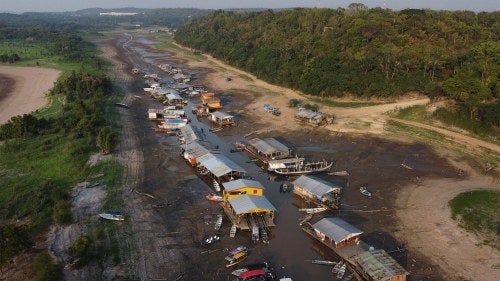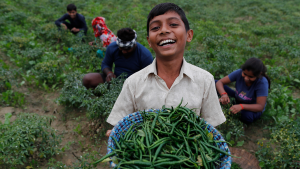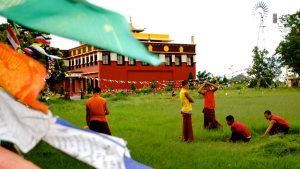Flu Takes Flight, CRISPR Chickens, and Wine Watch
Check out our roundup of the week's top news and research in food, agriculture, and global development.

Top Story
Israel-Hamas War Worsens Food Insecurity
In response to the Hamas attack on Israel, Israel announced a total blockade of the Gaza strip, barring residents from accessing many necessities, including food and water. This will lead to higher rates of food insecurity in the region, which was already high to begin with—even before the additional restrictions, residents of Gaza faced widespread food insecurity.
Council Insights
Salvation from Ancient Lands
On October 23, Senior Fellow Roger Thurow will join us for a members-only discussion on his upcoming book. He'll share stories from smallholder farmers around the world regarding the environmental impacts of their work that will leave you encouraged for the future of global agriculture. Not a member yet? Join the community today.
Food and Agriculture
Flu Takes Flight
Bird flu is taking a toll on commercial poultry farms around the world. Detected this week in the US for the first time since April, concerns are rising over the potential for the virus to spread. In response, some scientists are investigating how to use CRISPR to make chickens more resistant to bird flu in the future, while others are vaccinating millions of birds in France to reduce the present-day threat.
Seafood Struggles
Japanese seafood exports to China have fallen 71 percent compared to last year, a direct consequence of releasing treated water from the Fukushima nuclear plant into the ocean. To increase exports, Japan is now turning to Europe, holding promotional events and tastings for professionals in France, Britain, and Germany.
Drying Up
A severe drought in the Amazon rainforest is causing rivers to dry up, disrupting ship traffic and raising costs for northern shipping routes. Officials are warning that this could disrupt grain exports in the region, creating concerns for rising global food prices.
Deeper Dive
CRISPR Chickens
CRISPR, a gene-editing technology, could become one tool to reduce the toll of bird flu, but it’s not without limitations and risks. Breakthrough infections can still occur in gene-edited chickens, and the virus can quickly adapt to the new genes. However, the research provides proof of concept that scientists can move towards making chickens resistant to bird flu.
Resilience
Wine Watch
Rising temperatures, limited rainfall, and extreme weather are threatening France’s famous vineyards, but farmers are turning to biodiversity and organic practices as a solution. By integrating cover crops and expanding the variety of plants and animals, the farmers can reduce the impact of the changing climate.
DC Report
Committee Controversy
A report from the government watchdog Right to Know found that nine of the 20 experts on the 2025 Dietary Guidelines Advisory Committee have conflicts of interest with the food, beverage, pharmaceutical, or weight loss industries within the last five years. The Committee’s recommendations hold widespread influence, shaping federal food programs, physician guidance, nutrition education, and meal planning for schools, the military, prisons, and hospitals.
Big Actors
Taking On Traders
The United Nations Conference on Trade Development called for increased regulation and transparency for the agricultural commodity trading sector, which saw record profits as consumer costs soared over recent years. While food prices have risen significantly since 2020, the world’s four largest crop merchants—which control an estimated 70 percent of the global grain trade—reported a "dramatic rise in profits” in 2021 and 2022.
Big Ideas
Regeneration in Brazil
Brazilian farmers are trying new regenerative practices to grow soybeans—a crop which has long been associated with massive deforestation in the country—without clearing any more trees. The opportunity comes from 100 million hectares of degraded pastures that could be brought back into soy production through enriching the soil with crop rotation and cattle grazing.
Ask an Expert
What is the state of childhood stunting globally, and what inequities exist?
"Globally, progress has been made on reducing childhood stunting, with the World Health Organization reporting nearly two-thirds of countries seeing at least some improvement over the past two decades. But this is also where global inequalities are particularly pronounced. Africa was the only region where stunting was still on the rise. And more than half of all children affected by wasting lived in Southern Asia. Even with the global progress on stunting, the decline has been too slow and too little; achieving the SDG target requires that the current rate of yearly decline – a bit more than two percent – doubles in the coming years."
—Senior Fellow Roger Thurow in GFFT


Have a question about food and agriculture? Ask one of our experts at the Center on Global Food and Agriculture to get an answer in next week's Global Food for Thought!
Council Events
Did you miss one of our previous livestreams? Don't worry! They are all available on our website to watch at any time.
Other Upcoming Events
Scaling Up Experiential Learning Tools for Sustainable Water Governance in India
Date: October 18
Time: 5:00 – 10:00 a.m. ET
A Look at Global Rice Markets: Export Restrictions, El, Niño, and Price Controls
Date: October 18
Time: 9:00 – 10:30 a.m. ET
Serving Up Sustainability: From Restaurants to the Home Kitchen
Date: October 18
Time: 3:00 – 4:30 p.m. CT
Food Systems Repercussions of the Russia-Ukraine War
Date: October 26
Time: 12:30 – 1:30 p.m. ET
2023 National Agricultural Marketing Summit
Date: November 12 - 14
Land Acknowledgement Statement
The Center on Global Food and Agriculture recognizes it occupies the ancestral land of the Kiikaapoi, Peoria, Kaskaskia, Bodwéwadmi, and Myaamia people. Indigenous communities around the world disproportionately experience the pressures of climate change, global conflicts, and the COVID-19 pandemic, while simultaneously stewarding 80 percent of the world’s biodiversity. These Indigenous tribes and nations are the original owners of this land and continue to be systemically erased by policies and practices that ignore their histories. To learn more about Indigenous foodways and practices, check out our 2022 blog series "Stewardship, Sovereignty, and Solutions."





